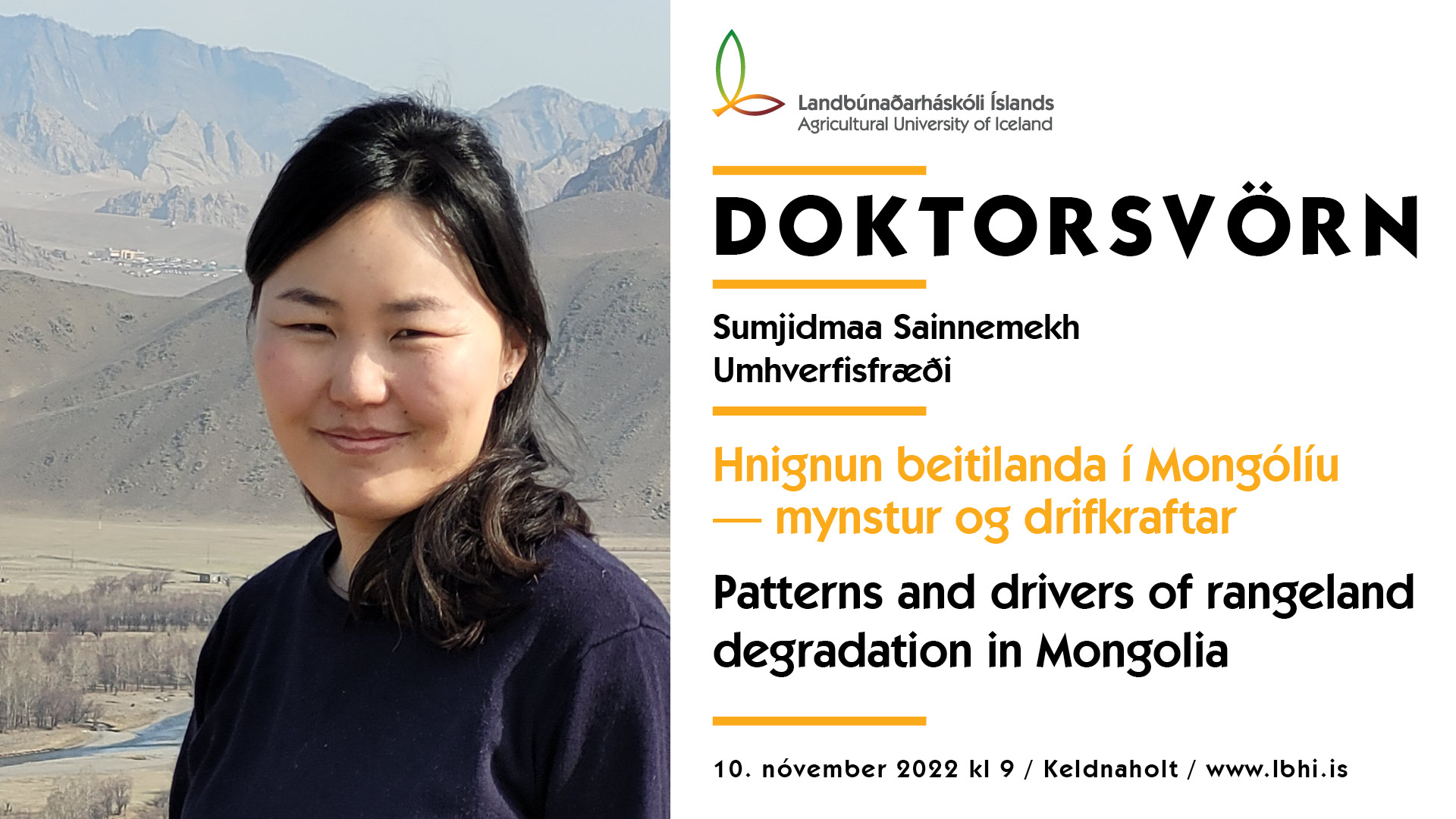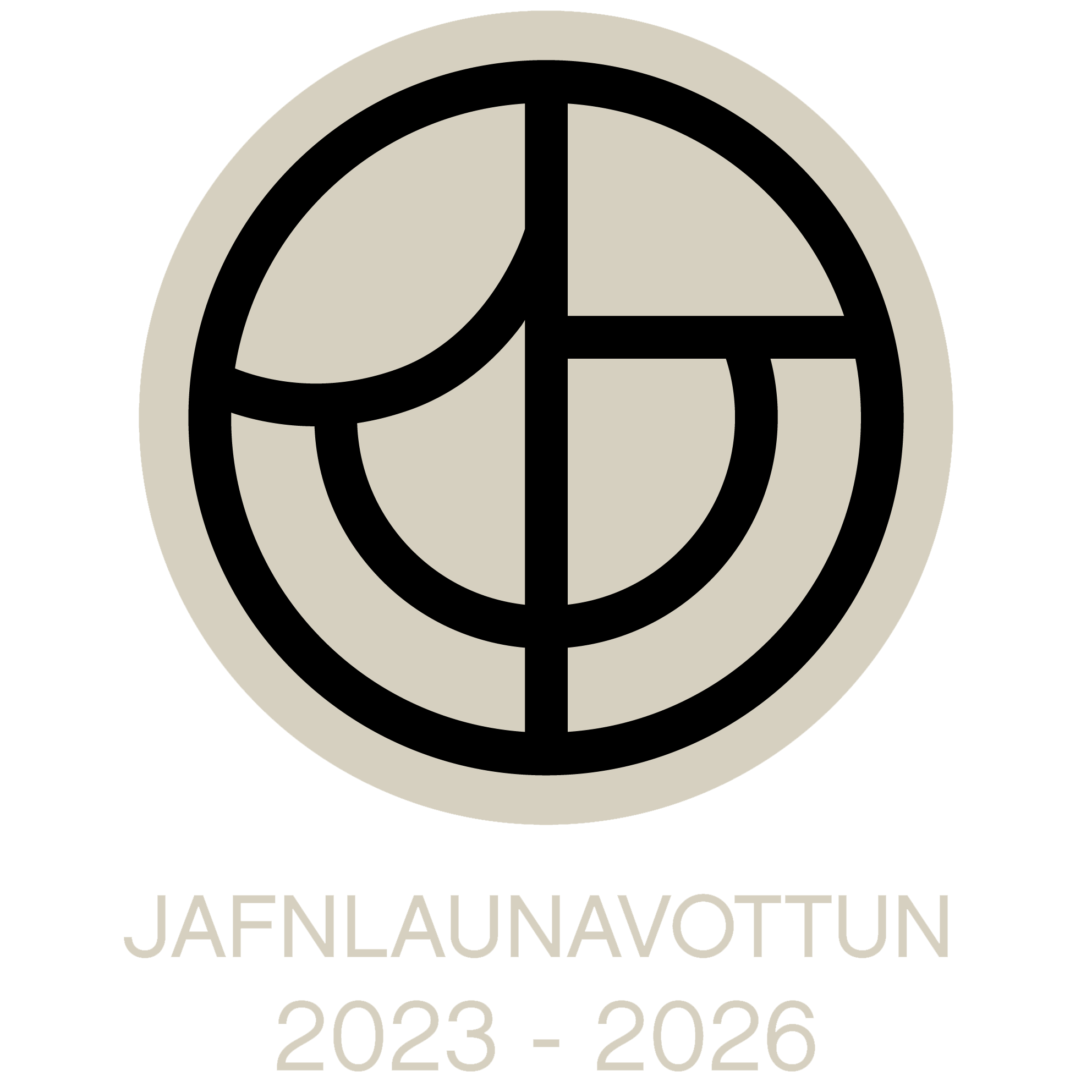Þann 10. nóvember næstkomandi mun Sumjidmaa Sainnemekh verja doktorsritgerð sína á sviði umhverfisfræða, við deild Náttúru og skóga við Landbúnaðarháskóla Íslands. --English below--
Ritgerðin ber heitið Hnignun beitilanda í Mongólíu — mynstur og drifkraftar e. Patterns and drivers of rangeland degradation in Mongolia.
Vörnin fer fram á Keldnaholti Árleyni 22, Reykjavík, í Sauðafelli á þriðju hæð og hefst klukkan 09:00. Vörninni verður einnig streymt á Teams hér.
Áheyrendur eru vinsamlega beðnir um að slökkva á eigin hljóðnema og myndavél á meðan fyrirlesturinn fer fram, en mega gjarnan kveikja á þeim þegar gefið verður færi á spurningum í lok varnar.
Andmælendur ritgerðarinnar eru Dr. Leslie Roche frá Háskólanum í Kaliforníu Davis í Bandaríkjunum og Próf. David Kemp frá Charles Sturt University í Ástralíu.
Leiðbeinendur Sumjidmaa eru Próf. Isabel C. Barrio, Landbúnaðarháskóla Íslands, Próf. Ása L. Aradóttir, Landbúnaðarháskóla Íslands, Dr. Brandon Bestelmeyer, United States Department of Agriculture-Agricultural Research Service, og Dr. Bulgamaa Densambuu, Mongolian National Federation of Pasture User Groups.
Ágrip:
Beitilöndum stafar vaxandi hætta frá loftlagsbreytingum og ofbeit. Breytt landnýting ásamt hnignun beitilanda er einnig í auknum mæli áhyggjuefni um heim allan. Hnignuð beitilönd hafa minni getu en óhnignuð til að veita þau náttúrulegu gæði sem þörf er á til að fullnægja þörfum samfélaga hirðingja og tryggja tilveru hefðbundins hirðingjabúskapar. Á undanförnum áratugum hafa komið fram alvarlegar áhyggjur af sívaxandi hnignun beitilanda í Mongólíu. Skilningur á hnignun beitilanda og mat á langtíma þróun gróðurfarsbreytinga er nauðsynleg undirstaða fyrir þróun leiða til sjálfbærrar nýtingar á þeim. Beitilönd í Mongólíu eru um 2,5% af heildarþekju graslendis í heiminum og eru talin vera á meðal síðustu beitilanda heimsins sem eru óröskuð. Þau ná yfir meginhluta Mongólíu og tengist beit búpenings á beitilöndum lífsviðurværi nærri helmings mongólsku þjóðarinnar.
Meginmarkmið þessa doktorsverkefnis voru (1) að taka saman fyrri rannsóknir á hnignun beitilanda í Mongólíu og meta og draga saman með kerfisbundnum hætti upplýsingar um hvernig mismunandi rannsóknir greindu hnignun, á hvaða fræðilega grunni þær byggðu og hverjir voru orsakavaldar hnignunar, ásamt landfræðilegri dreifing þessara rannsókna, (2) að greina leitni gróðurfarsbreytinga í mongólskum beitilöndum með því að nýta langtíma vöktunargögn sem ná yfir stór svæði og (3) að meta orsakir gróðurfarsbreytinga yfir ~10 ára tímabil á gresjum Mongólíu út frá nákvæmum mælingum á gróðurfari.
Sumjidmaa Sainnemekh lauk BSc gráðu við School of Biology and Biotechnology við National University of Mongolia árið 2009 og MSc gráðu frá sama háskóla árið 2012.
Eftir útskrift vann Sumjidmaa við rannsóknir hjá Mongolian Society for Rangeland Management, Information and Research Institute of Meteorology, Hydrology and Environment of Mongolia, fyrir Green Gold Project og fyrir National Federation of Pasture User Groups of Mongolia. Sumjidmaa hóf doktorsnám við Landbúnaðarháskóla Íslands í ágúst árið 2019 með styrk frá Landgræðsluskóla GRÓ.
On November 10th Sumjidmaa Sainnemekh will defend her PhD dissertation in the field of environmental sciences at the Faculty of Environmental and Forest Sciences of the Agricultural University of Iceland.
Her thesis is titled Patterns and drivers of rangeland degradation in Mongolia.
The defence will take place at 9:00 GMT in Keldnaholt, Reykjavík, in Sauðafell on the third floor. The defence will be streamed on Teams.
Attendees are requested to mute their microphones and turn off their camera while the presentation takes place. They will be given the opportunity to ask questions at the end of the defense.
The opponents are Dr. Leslie Roche form the University of California Davis, in the US, and Prof. David Kemp, from Charles Sturt University in Australia.
Sumjidmaa’s supervisors are Prof. Isabel C. Barrio, Agricultural University of Iceland, Prof. Ása L. Aradóttir, Agricultural University of Iceland, Dr. Brandon Bestelmeyer, United States Department of Agriculture-Agricultural Research Service, and Dr. Bulgamaa Densambuu, Mongolian National Federation of Pasture User Groups.
Summary
Rangelands are currently facing increasing threats from climate change, overgrazing and land conversion and rangeland degradation is a growing concern worldwide. The ability of degraded rangelands to provide the natural resources needed to sustain pastoralists and ensure the persistence of traditional nomadic lifestyles is less than that of healthy rangelands. In Mongolia, serious concerns have emerged in recent decades about the accelerating rate of rangeland degradation. Understanding rangeland degradation and assessing long term trends of vegetation change is thus critical to design sustainable management practices. Mongolian rangelands represent about 2.5% of the world’s total grassland area and are considered among the last intact rangelands in the world. Most of the Mongolian territory is covered by rangelands and the livelihoods of nearly half of the Mongolian population are related to livestock grazing on rangelands.
The main objectives of this PhD thesis were (1) to compile previous studies on rangeland degradation in Mongolia and systematically review and synthesize information on how studies identified degradation, the theoretical frameworks used, drivers of degradation and the geographical distribution of studies, (2) to detect trends in vegetation change in Mongolian rangelands using broad scale long-term monitoring data, and (3) to investigate the drivers of change in vegetation over ~10 years in the steppe zone of Mongolia using detailed field data.
Sumjidmaa Sainnemekh completed a BSc degree at the School of Biology and Biotechnology of the National University of Mongolia in 2009, and a MSc degree at the same institution in 2012. After graduation, she worked as a researcher for the Mongolian Society for Rangeland Management, the Information and Research Institute of Meteorology, Hydrology and Environment of Mongolia and the Green Gold Project, and for the National Federation of Pasture User Groups of Mongolia. Sumjidmaa started her PhD studies at the Agricultural University of Iceland in August 2019, supported by a doctoral fellowship from the GRÓ LRT programme.






